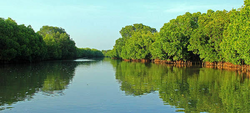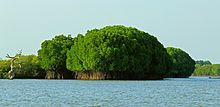Pichavaram
11°25′57″N 79°46′51″E / 11.43250°N 79.78083°E
Pichavaram
பிச்சாவரம் | |
|---|---|
 Pichavaram Mangrove Forest | |
| Coordinates: 11°25′N 79°47′E / 11.41°N 79.78°E | |
| Country | |
| State | Tamil Nadu |
| District | Cuddalore |
| Taluk | Bhuvanagiri |
| Town Panchayath | Parangipettai |
| Area | |
• Total | 14.79 km2 (5.71 sq mi) |
| Elevation | 6 m (20 ft) |


Pichavaram is one of the villages of Parangipettai near Chidambaram in Cuddalore District, Tamil Nadu, India.[1][2] It is located between the Vellar estuary in the north and Coleroon estuary in the south. The Vellar-Coleroon estuarine complex forms the Killai backwater and the mangroves that are permanently rooted in a few feet of water. It is located at a distance of 243 km from Chennai and 15 km from Chidambaram.
Mangrove forests
[edit]Pichavaram consists of a number of islands interspersing a vast expanse of water covered with mangrove forest.[3] The Pichavaram mangrove Forest is one of the largest mangrove forests in India covering about 45 km2 of area (as of 2019). It is separated from the Bay of Bengal by a sand bar. The biotope consists of species like Avicennia and Rhizophora. It also supports the existence of rare varieties of economically important shells and fishes.[4][5]
Fauna
[edit]The mangroves also attract migrant and local birds including snipes, cormorants, egrets, storks, herons, spoonbills and pelicans. About 177 species of birds belonging to 15 orders and 41 families have been recorded. The high population of birds could be seen from November to January due to the high availability of prey, the coincidence of the time of arrival of true migrants from foreign countries and local migrants from their breeding grounds across India. The availability of different habitat types such as channels, creeks, gullies, mudflats and sand flats and adjacent seashore offers ideal habitats for different species of birds and animals.
Gallery
[edit]-
Mangroves of Pichavaram
-
Mangroves canopy
-
Aerial roots of Mangroves
References
[edit]- ^ "UNESCO list".
- ^ "Mangrove forests". Archived from the original on 2009-12-10. Retrieved 2014-08-04.
- ^ "Pichavaram Mangrove". Tamil Nadu Wetlands Mission.
- ^ "Mangroves of INDIA". Tamil Nadu Agricultural University.
- ^ "Top 5 Largest Mangrove and Swamp Forest in India".





